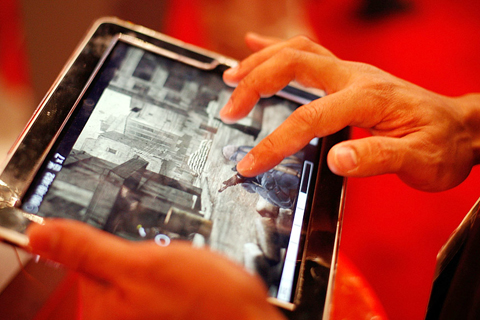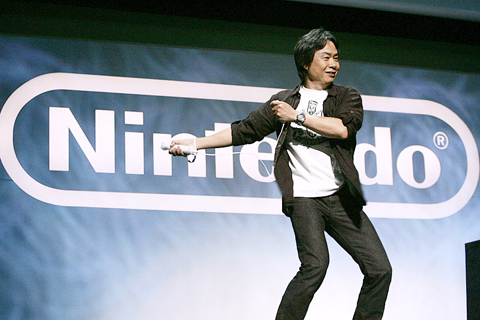Video game makers are about to try to convince you that fancy 3D screens, gesture-recognition cameras and ultra-sensitive motion controllers topped with brightly glowing spheres are what you need to have a good time.
They’ll do this as they try to emerge from a slump in the recession, which shocked a business long believed to be protected from, if not totally immune to, the workings of the broader economy.
Much of the industry’s success this year is riding on whether Microsoft, Nintendo, Sony and game publishers are able to sway consumers toward new, maybe even pricey ways to experience games — even as free or inexpensive options on Facebook, smartphones and the iPad compete for their attention.

PHOTO: AFP
Last week at E3, as the Electronic Entertainment Expo in Los Angeles is called, game companies showed off several new mechanisms for playing games. Among them was Move, which is Sony’s new motion controller for the PlayStation 3 (PS3) and launches this fall, when it is expected to cost less than US$100. A black remote with a color-changing ball on top, it builds on the success of the Nintendo Wii’s popular motion-control wand, but it promises more precision. A camera called PlayStation Eye recognizes the glowing orb and uses it to track the remote’s position in a 3D space, further immersing players in the game.
Even so, Fidel Martinez may need a bit of convincing. The 19-year-old PS3 owner said he likes his button-filled video game controllers just fine. Walking out of New York’s Nintendo World store recently after buying a wallet, Martinez said he doesn’t think he’ll buy Move.
“It’s too weird,” Martinez said. “The times I’ve played [motion-controlled] games has been strange. I’d rather use the old kind.”

PHOTO: AFP
Sony is betting he’ll change his mind. Richard Marks, senior researcher at the company and the brains behind Move, thinks the controller will appeal to gamers like Martinez, even if they snubbed the Wii’s gesturing wand.
“One of our design goals was to make sure it stood out as a completely different experience that has never been seen before,” Marks said.
The company has been pouring millions of dollars into marketing the PS3 with the tagline, “It only does everything.” The goal is to rope in consumers more likely to watch movies and play party games than shoot on-screen enemies for hours on end.

PHOTO: BLOOMBERG
“In many regards we are treating the launch of Move like the launch of a new platform,” said Peter Dille, senior vice president of marketing for Sony Computer Entertainment. “We believe [it] will help us expand the audience of PS3 users.”
Microsoft, too, wants to expand its gaming audience — a concept Nintendo mastered with the 2006 launch of the Wii, which got moms, grandmas and grandpas playing alongside young kids.
Natal, Microsoft’s upcoming game technology, uses a camera and gesture recognition to turn players’ bodies into controllers. After the camera recognizes you — your body shape and movements down to the smallest toss of your hair, you’ll be able to swing your hands to swipe at on-screen dodge balls or pretend you’re Godzilla and smash virtual buildings with swing of your arm. You could even scan in your real-life skateboard to ride a version of it in a game.

PHOTO: BLOOMBERG
“This is really what we like to think of as the rebirth of our brand,” said Dennis Durkin, chief operating officer of Microsoft’s video game business.
To do that, Microsoft needs to keep appealing to its core gamer fans, mostly men in their 20s, 30s and 40s who count Halo, Call of Duty and Gears of War among their favorite entertainment franchises. But, like Sony with the PlayStation 3, it’s also selling the Xbox 360 to families as an all-in-one entertainment device.
E3, which had events from last Sunday through Thursday, was where many store chains decided what games and gaming systems, and how many of them, to stock for the holiday shopping season. That period is crucial for the industry, which analysts say gets about 40 percent of its revenue in the final three months of the year.
Analyst firm DFC Intelligence estimates that the worldwide video game retail industry will reap revenue of US$59.5 billion this year, down slightly from US$60.4 billion last year and well below the more than US$68 billion in 2008.
Because the industry has yet to fully rebound from the recession, Jesse Divnich, an analyst with Electronic Entertainment Design and Research, called E3 an “inflection point,” with game companies under pressure to impress.
While hardcore gamers have flocked to shooters and sequels with loyal predictability, more “casual” players can be fickle.
Largely responsible for the runaway success of the Wii, the players who dabble in video games as a hobby but not as a lifestyle can’t be expected to spend US$60 every time a new game comes out, even in a better economy. That’s why it’s important for game companies to sell a wide range of entertainment options.
“Something that is new, something that is true innovation, something that unlocks new experiences,” Microsoft’s Durkin said, is something families “are willing to pay for.”

Nvidia Corp yesterday unveiled its new high-speed interconnect technology, NVLink Fusion, with Taiwanese application-specific IC (ASIC) designers Alchip Technologies Ltd (世芯) and MediaTek Inc (聯發科) among the first to adopt the technology to help build semi-custom artificial intelligence (AI) infrastructure for hyperscalers. Nvidia has opened its technology to outside users, as hyperscalers and cloud service providers are building their own cost-effective AI chips, or accelerators, used in AI servers by leveraging ASIC firms’ designing capabilities to reduce their dependence on Nvidia. Previously, NVLink technology was only available for Nvidia’s own AI platform. “NVLink Fusion opens Nvidia’s AI platform and rich ecosystem for

WARNING: From Jan. 1 last year to the end of last month, 89 Taiwanese have gone missing or been detained in China, the MAC said, urging people to carefully consider travel to China Lax enforcement had made virtually moot regulations banning civil servants from making unauthorized visits to China, the Control Yuan said yesterday. Several agencies allowed personnel to travel to China after they submitted explanations for the trip written using artificial intelligence or provided no reason at all, the Control Yuan said in a statement, following an investigation headed by Control Yuan member Lin Wen-cheng (林文程). The probe identified 318 civil servants who traveled to China without permission in the past 10 years, but the true number could be close to 1,000, the Control Yuan said. The public employees investigated were not engaged in national

CAUSE AND EFFECT: China’s policies prompted the US to increase its presence in the Indo-Pacific, and Beijing should consider if this outcome is in its best interests, Lai said China has been escalating its military and political pressure on Taiwan for many years, but should reflect on this strategy and think about what is really in its best interest, President William Lai (賴清德) said. Lai made the remark in a YouTube interview with Mindi World News that was broadcast on Saturday, ahead of the first anniversary of his presidential inauguration tomorrow. The US has clearly stated that China is its biggest challenge and threat, with US President Donald Trump and US Secretary of Defense Pete Hegseth repeatedly saying that the US should increase its forces in the Indo-Pacific region

ALL TOGETHER: Only by including Taiwan can the WHA fully exemplify its commitment to ‘One World for Health,’ the representative offices of eight nations in Taiwan said The representative offices in Taiwan of eight nations yesterday issued a joint statement reiterating their support for Taiwan’s meaningful engagement with the WHO and for Taipei’s participation as an observer at the World Health Assembly (WHA). The joint statement came as Taiwan has not received an invitation to this year’s WHA, which started yesterday and runs until Tuesday next week. This year’s meeting of the decisionmaking body of the WHO in Geneva, Switzerland, would be the ninth consecutive year Taiwan has been excluded. The eight offices, which reaffirmed their support for Taiwan, are the British Office Taipei, the Australian Office Taipei, the